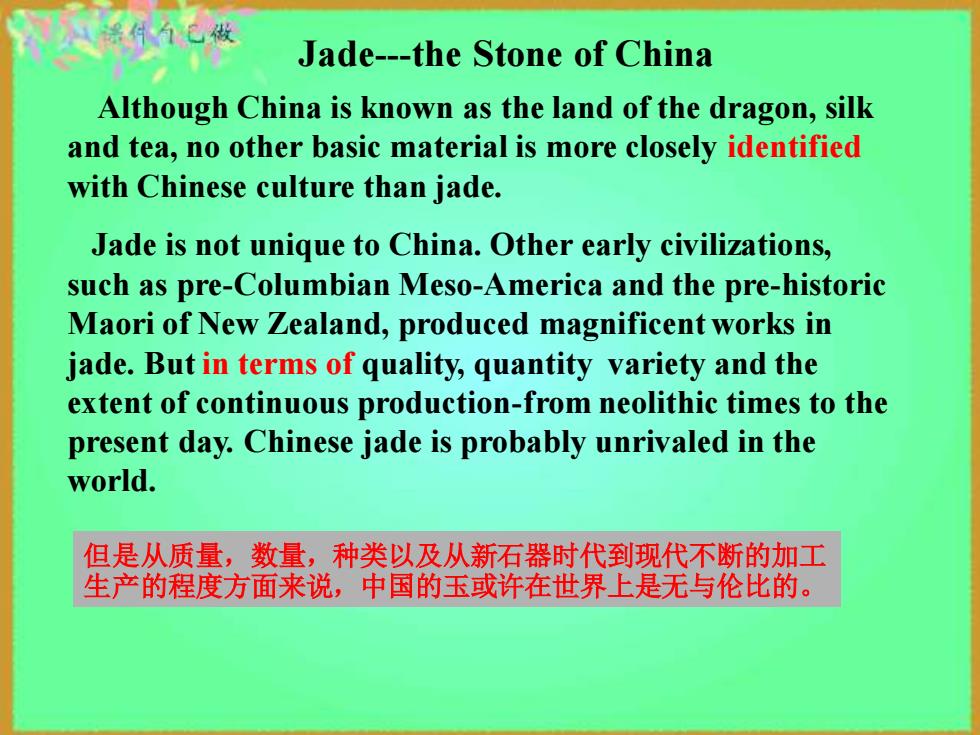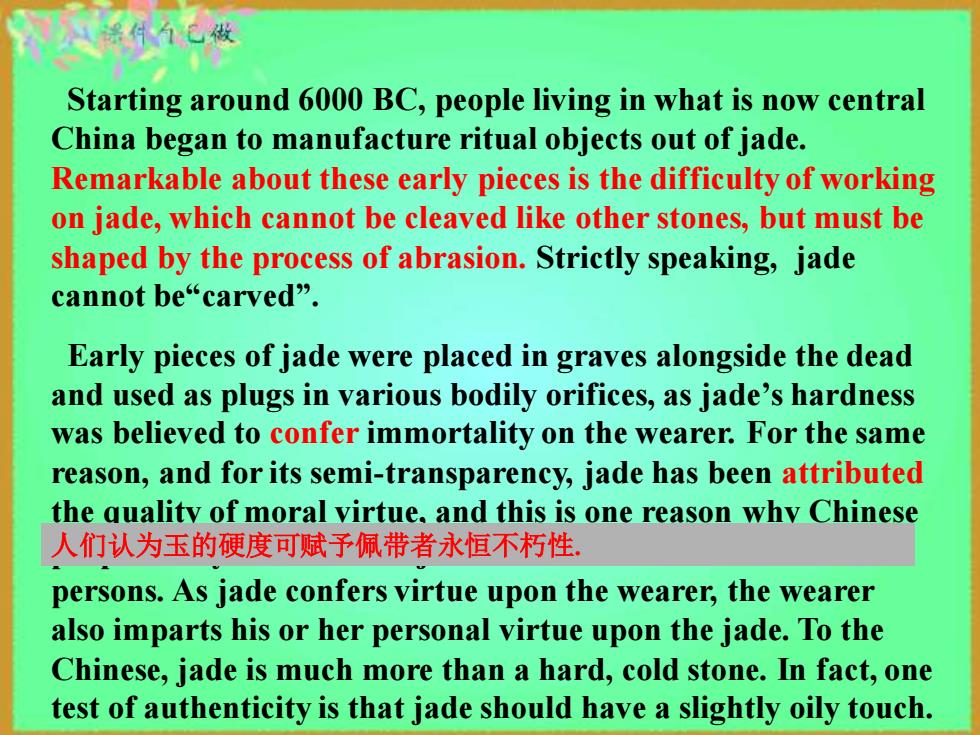
Jade---the Stone of China Although China is known as the land of the dragon,silk and tea,no other basic material is more closely identified with Chinese culture than jade. Jade is not unique to China.Other early civilizations, such as pre-Columbian Meso-America and the pre-historic Maori of New Zealand,produced magnificent works in jade.But in terms of quality,quantity variety and the extent of continuous production-from neolithic times to the present day.Chinese jade is probably unrivaled in the world. 但是从质量,数量,种类以及从新石器时代到现代不断的加工 生产的程度方面来说,中国的玉或许在世界上是无与伦比的
Jade---the Stone of China Although China is known as the land of the dragon, silk and tea, no other basic material is more closely identified with Chinese culture than jade. Jade is not unique to China. Other early civilizations, such as pre-Columbian Meso-America and the pre-historic Maori of New Zealand, produced magnificent works in jade. But in terms of quality, quantity variety and the extent of continuous production-from neolithic times to the present day. Chinese jade is probably unrivaled in the world. 但是从质量,数量,种类以及从新石器时代到现代不断的加工 生产的程度方面来说,中国的玉或许在世界上是无与伦比的

The Art ofAbrasion Starting around 6000 BC,people living in what is now central China began to manufacture ritual objects out of jade. Remarkable about these early pieces is the difficulty of working on jade,which cannot be cleaved like other stones,but must be shaped by the process of abrasion.Strictly speaking,jade cannot be“carved. Early pieces of jade were placed in graves alongside the dead and used as plugs in various bodily orifices,as jade's hardness was believed to confer immortality on the wearer.For the same reason,and for its semi-transparency,jade has been attributed the quality of moral virtue.and this is one reason why Chinese 这些早期制品的显著之处在于玉的加工十分困难-玉不能象其它石头 那样被分割,必须经过打磨过程才能出形. also imparts his or her personal virtue upon the jade.To the Chinese,jade is much more than a hard,cold stone.In fact,one test of authenticity is that jade should have a slightly oily touch
The Art of Abrasion Starting around 6000 BC, people living in what is now central China began to manufacture ritual objects out of jade. Remarkable about these early pieces is the difficulty of working on jade, which cannot be cleaved like other stones, but must be shaped by the process of abrasion. Strictly speaking, jade cannot be“carved”. Early pieces of jade were placed in graves alongside the dead and used as plugs in various bodily orifices, as jade’s hardness was believed to confer immortality on the wearer. For the same reason, and for its semi-transparency, jade has been attributed the quality of moral virtue, and this is one reason why Chinese people today still treasure jade and wear it close to their persons. As jade confers virtue upon the wearer, the wearer also imparts his or her personal virtue upon the jade. To the Chinese, jade is much more than a hard, cold stone. In fact, one test of authenticity is that jade should have a slightly oily touch. 这些早期制品的显著之处在于玉的加工十分困难----玉不能象其它石头 那样被分割,必须经过打磨过程才能出形

Starting around 6000 BC,people living in what is now central China began to manufacture ritual objects out of jade. Remarkable about these early pieces is the difficulty of working on jade,which cannot be cleaved like other stones,but must be shaped by the process of abrasion.Strictly speaking,jade cannot be“carved”. Early pieces of jade were placed in graves alongside the dead and used as plugs in various bodily orifices,as jade's hardness was believed to confer immortality on the wearer.For the same reason,and for its semi-transparency,jade has been attributed the quality of moral virtue,and this is one reason why Chinese confer v.(on,upon)授与(称号,学位等),赋子 confer a title on(upom)sb.授子某人一个称号 An honorary degree was conferred on him by the university 这所大学授予他荣誉学位。 Cninese,Jade is mucn more tnan a nard,cold stone.In fact,one test of authenticity is that jade should have a slightly oily touch
Starting around 6000 BC, people living in what is now central China began to manufacture ritual objects out of jade. Remarkable about these early pieces is the difficulty of working on jade, which cannot be cleaved like other stones, but must be shaped by the process of abrasion. Strictly speaking, jade cannot be“carved”. Early pieces of jade were placed in graves alongside the dead and used as plugs in various bodily orifices, as jade’s hardness was believed to confer immortality on the wearer. For the same reason, and for its semi-transparency, jade has been attributed the quality of moral virtue, and this is one reason why Chinese people today still treasure jade and wear it close to their persons. As jade confers virtue upon the wearer, the wearer also imparts his or her personal virtue upon the jade. To the Chinese, jade is much more than a hard, cold stone. In fact, one test of authenticity is that jade should have a slightly oily touch. confer v. (on , upon) 授与(称号,学位等),赋予 confer a title on (upon) sb. 授予某人一个称号 An honorary degree was conferred on him by the university . 这所大学授予他荣誉学位

Starting around 6000 BC,people living in what is now central China began to manufacture ritual objects out of jade. Remarkable about these early pieces is the difficulty of working on jade,which cannot be cleaved like other stones,but must be shaped by the process of abrasion.Strictly speaking,jade cannot be“carved”. Early pieces of jade were placed in graves alongside the dead and used as plugs in various bodily orifices,as jade's hardness was believed to confer immortality on the wearer.For the same reason,and for its semi-transparency,jade has been attributed the quality of moral virtue.and this is one reason why Chinese 人们认为玉的硬度可赋予佩带者永恒不朽性 persons.As jade confers virtue upon the wearer,the wearer also imparts his or her personal virtue upon the jade.To the Chinese,jade is much more than a hard,cold stone.In fact,one test of authenticity is that jade should have a slightly oily touch
Starting around 6000 BC, people living in what is now central China began to manufacture ritual objects out of jade. Remarkable about these early pieces is the difficulty of working on jade, which cannot be cleaved like other stones, but must be shaped by the process of abrasion. Strictly speaking, jade cannot be“carved”. Early pieces of jade were placed in graves alongside the dead and used as plugs in various bodily orifices, as jade’s hardness was believed to confer immortality on the wearer. For the same reason, and for its semi-transparency, jade has been attributed the quality of moral virtue, and this is one reason why Chinese people today still treasure jade and wear it close to their persons. As jade confers virtue upon the wearer, the wearer also imparts his or her personal virtue upon the jade. To the Chinese, jade is much more than a hard, cold stone. In fact, one test of authenticity is that jade should have a slightly oily touch. 人们认为玉的硬度可赋予佩带者永恒不朽性